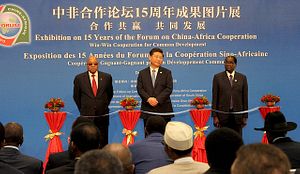At a time when China’s growth is responsible for much of the world’s economic dynamism, Western media outlets have taken to publishing reports urging caution in the face of the country’s expanding influence. These reports have criticized as examples of neo-colonialism initiatives such as the Forum on China-Africa Cooperation (FOCAC) – established in 2000 and the symbol of Chinese moves toward Africa – and infrastructure development involving loans to developing countries under projects like the One Belt, One Road concept proposed in 2013.
At the same time, the expectations of recipient countries have surged in recent years. One factor is the transformation in the late 2000s of Africa from a “basket case” beset with AIDS, civil wars, poverty, and other problems, to a “continent of hope” enjoying impressive rates of economic growth. African nations and, above all, their leaders, have come to see the relationship with China in a positive light, as an engine for economic growth.
Commodities prices have climbed with the expansion of the Chinese economy and this has bolstered GDP in the African countries of origin since the 2000s. In 2009, China became the largest trading partner of the African continent, importing large quantities of resources, and investing huge sums in development. The rate of growth of the Chinese economy has certainly slowed over the past two or three years and imports from Africa have also been affected by the slump in international resource prices. However, the respect and confidence in China that has been built has not suffered.
The infrastructure that China has built in Africa is one of the main factors for China’s popularity in African nations. Amid the increase in new harbors, roads, and airports, railways in particular have been a massive bonus not only for the governments of the countries on the receiving end of loans, but also for the people of those countries. With a history of more than forty years, Chinese railway construction in Africa dates back to the Tanzania-Zambia Railway (TARAZA) in the early 1970s. Starting with the Ethiopia-Djibouti railway and urban transportation networks in each country, there are still now many projects underway, building international railroad networks linking the countries in East Africa.
These trains are not the high-speed TGV or bullet train variety. For landlocked nations, however, rail facilitates the transport of a wide range of agricultural products and primary resources to harbors in a fraction of the time and in much large quantities than was the case in the past. In addition, the local railroads open up business opportunities for small merchants and farmers who have no means of transport. Certainly, it may be the case that Chinese construction companies hardly ever use local labor, but bring engineers and workers with them from China. However, the lines provide support for everyday life and this has left people with a positive impression. The railways built during the colonial period were constructed for the convenience of colonial entrepreneurs, and most are in a state of disrepair because they were not maintained after independence. Airline routes in Africa often connect major cities with the former suzerain states, and Africans who want to visit a neighboring country may have to transit via Europe. It is not likely that anyone draws comparisons between airplanes and the current local train systems as means of transport, but if vestiges of Eurocentrism linger even in the airline routes, it is not difficult to imagine that Africans would welcome Chinese business capital building infrastructure for local people.
Personally, I believe that respect for China also includes elements of “aspiring towards the developmental state.” Although China is still a developing nation, a strong (in fact, authoritarian) state has built an economy that guarantees the lives of its citizens, winning recognition for its success, and perhaps this has given people hope. It is hardly surprising that the “developmental state,” which links national integration with economic development, is one of the ideals for leaders of countries that were not easily able to deliver on talk of national unification at the time of their independence. We might note here that the origins of the description of the developmental state are found in Japan. Of course, African countries also welcome investment from Japan. As long as investments provide business opportunities, Africans believe it is better to deal with the real problems of having lots of options.
From the Chinese perspective, the African continent is the last stop for the One Belt, One Road concept. Since the economic reforms in 1979 and the emergence of the concept of the “socialist market economy” in the 1990s, the market (read: demand) has become the essential growth factor for the economy in China. The One Belt, One Road is a structure that will generate new demand to counter the excess supply capacity of the Chinese economy. Even if the loans become uncollectable, China does not need to recoup its capital outlays at this stage. Mining rights for natural resources, harbor leases, and other settlements in kind are far more useful to the future of the Chinese economy. Even if such “goodies” are abandoned, China can score a significant win in the long term if it can form a renminbi economic zone and provide the groundwork for building a world where international trade does not rely on the U.S. dollar.
To make this economic zone a more comfortable place for everyone, it is crucial to start efforts early to get the message across to China that a unilateral hegemony is not a good policy for Pax Sinica.
Michiko Kitaba is a professor at Kansai University.
































